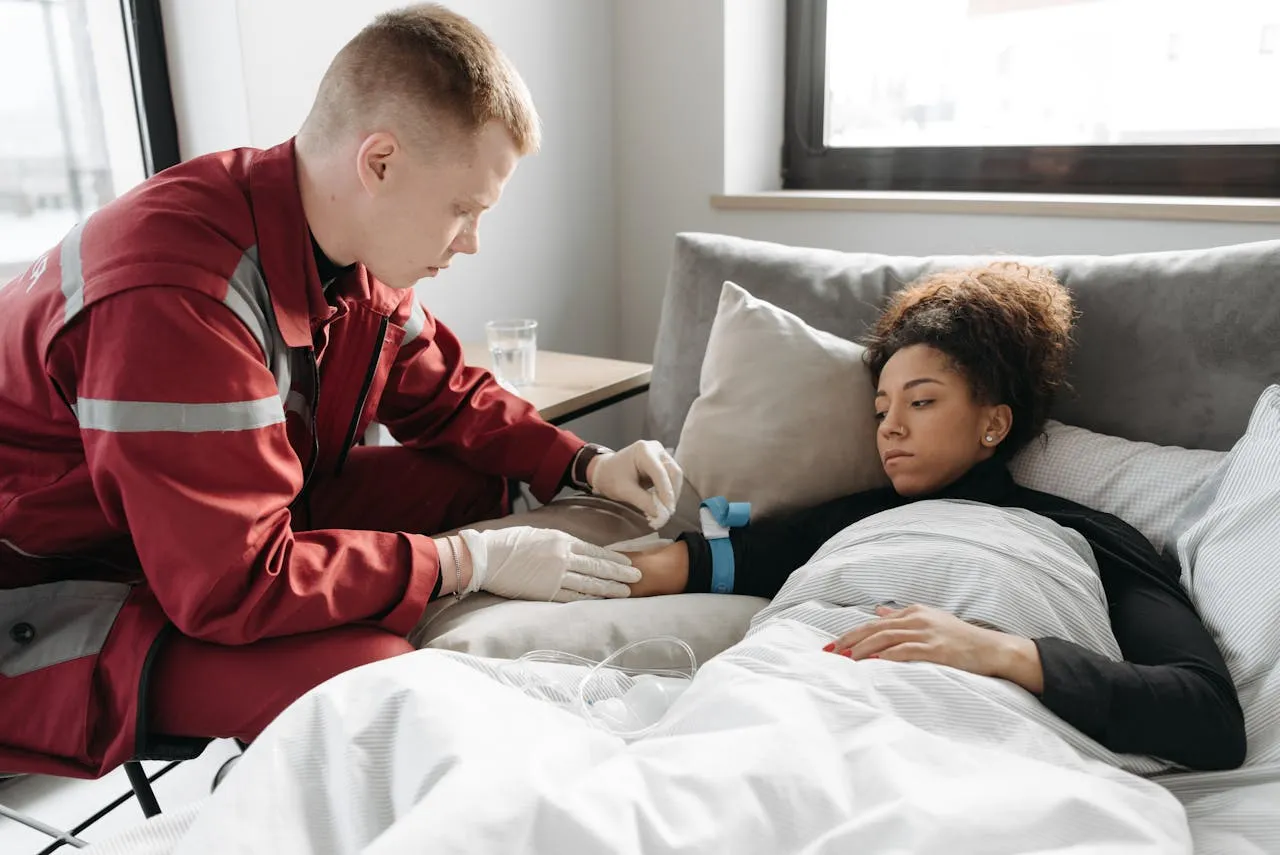
Immediate Actions – What to Do If Someone Gets an Electric Shock?
If someone gets an electric shock, act fast but stay safe. First, try to turn off the power. If that’s not feasible to separate directly, then use a non-conductive object, such as a wooden broom handle, to separate them safely. Please don’t touch them directly; you could get shocked too. Check if they’re breathing.
If someone is electrocuted and loses consciousness, call emergency services immediately. If you are trained in CPR (Cardiopulmonary Resuscitation), begin administering it right away.
Even if the person appears fine afterwards, seek urgent medical attention, as electric shocks can cause internal injuries that may not be immediately visible. For further guidance on first-aid procedures, consult a certified medical professional or trusted healthcare resources.
Table of Contents
- Immediate Response And Medical Attention to Electric Shocks
- Recognising Severe Electrical Shock Symptoms
- What to Do After the Emergency – Post-Shock Care
- Emergency Prayer for Electric Shock Victims
- Preventing Electric Shocks at Home & Work
- Understanding Electric Shock Consequences: Short-Term and Long-Term Health Effects
- Short-Term Health Effects of Electric Shock
- Long-Term Health Effects of Electric Shock
- How to recover from an electric shock?
- Final Thoughts: Staying Safe and Supporting Recovery
- References and Further Reading
- FAQs About Electric Shocks:
Immediate Response And Medical Attention to Electric Shocks
Here are some first-aid steps mentioned.
Keep the person cosy, apply cool compresses to burns, and monitor respiratory function:
Apply creams, touch burns with bare hands, or let them walk if it was a high-voltage shock. Minor shocks may only need observation, but severe cases require ER visits.
For burns, cover with a sterile dressing.
The Healthtolife advises against ignoring chest pain post-shock—it could signal heart complications.
Recognising Severe Electrical Shock Symptoms
Electric shock can be deadly even if symptoms seem mild at first. Watch for trouble breathing, seizures, or irregular heartbeat; these demand emergency care. Burns, numbness, or muscle pain are also red flags. If the person was hit by high-voltage current (like power lines), assume internal damage and call the rescue team immediately.
Even without visible injuries, electricity can disrupt the heart or nerves. Delayed symptoms like confusion or fatigue mean they need a doctor. The American Red Cross warns that some effects take hours to appear.
What to Do After the Emergency – Post-Shock Care
After an electric shock, monitor for 24 hours. Rest, hydrate, and watch for dizziness or chest pain. For minor shocks, rinse burns and change dressings daily. If muscle twitches or memory problems arise, see a doctor these could signal nerve damage.
Emotional support matters too. Anxiety after a shock is common. Resources like HealthtoLife.in offer guides on recovery. Shock Emergencies and Treatment Video
Emergency Prayer for Electric Shock Victims
O Allah, in this moment of crisis, we seek Your help. Grant Your healing mercy to this person struck by electric shock. Guide us to help them correctly, and protect us all from such dangers. Ameen.
Preventing Electric Shocks at Home & Work
Most shocks are preventable. Protect kids with outlet covers and replace any cords that are frayed or worn. In workplaces, lockout/tagout systems cut risks by 90% (OSHA data). Test GFCI outlets monthly; they shut off power during surges. File an incident report for workplace accidents to prevent recurrence.
For DIY fixes, hire a licensed electrician. The Electrical Safety Foundation (ESF) offers complimentary guides for ensuring home electrical safety.
Understanding Electric Shock Consequences: Short-Term and Long-Term Health Effects
Electrical shock can lead to instant injury as well as long-lasting harm or effects on the body. Even minor shocks may lead to burns, muscle spasms, or temporary numbness. Severe shocks can stop the heart, damage nerves, or trigger internal burns you can’t see.
Short-Term Health Effects of Electric Shock
Electric shock can cause a range of immediate health effects, including
- Burns: Electric shock can cause skin burns at the entry and exit points, often affecting the hands or feet.
- Heart Problems: High-voltage electric shock can disrupt the heart’s function, leading to irregular heartbeat (arrhythmia) or even cardiac arrest.
- Muscle Contractions: The violent muscle spasms caused by electric shock can be strong enough to fracture bones or dislocate joints.
- Nerve Damage: Electric shock can damage the nerves, causing tingling, weakness, or paralysis.
Long-Term Health Effects of Electric Shock
Chronic Pain: Neuropathy, or nerve damage, can cause ongoing pain characterised by burning or stabbing sensations.
Memory and Cognition Issues: In rare cases, severe electric shocks can impact brain function, leading to memory problems, difficulty concentrating, or other cognitive impairments.
Psychological Trauma: Surviving an electric shock can be traumatic, and some individuals may develop anxiety, post-traumatic stress disorder (PTSD), or an intense fear of electricity.
Organ Damage: In severe cases, electric shock can cause muscle tissue to break down, leading to delayed kidney failure or other organ damage.
When to See a Doctor:
- Any high-voltage shock (even if you feel fine).
- Chest pain, trouble breathing, or seizures.
- Worsening numbness/tingling after 24 hours.
How to recover from an electric shock?

After an electric shock, take immediate action with these steps to support a full recovery:
- Seek immediate medical attention
- Get checked out by a doctor, even if the shock seems minor. Even minor electric shocks can lead to internal injuries. Get an ECG test to monitor heart activity and to identify irregularities.
- Treat burns
- If there are burns on the skin, wash them with clean water and cover them with a sterile bandage. Apply antibiotic cream, but do not use any medications without consulting a doctor.
- Repair nerve damage
- If you are experiencing numbness or weakness in your hands or feet, seek physiotherapy. Vitamin B complex and magnesium supplements can help strengthen the nervous system.
- Take care of your heart health
- Avoid strenuous exercise for at least a week after an electric shock. Keep salt and caffeine in moderation to support overall cardiovascular well-being.
- Pay attention to your mental health
- If you feel anxious or fearful after a shock, talk to a psychologist. Relaxation techniques (deep breathing, meditation) can help reduce stress.
- Long-term monitoring
- Note your body’s response for a few weeks. If you experience dizziness, chest pain, or persistent weakness, see a doctor immediately.
Precautions: Have your home electrical safety checked (such as checking the ground wire).
Final Thoughts: Staying Safe and Supporting Recovery
Electric shocks can be frightening, but knowing how to respond and how to recover can make all the difference. Whether the shock was minor or severe, always prioritise medical evaluation, as hidden damage (especially to the heart or nerves) is common. Follow-up care, rest, and monitoring are key to full recovery.
References and Further Reading
This article uses trusted medical facts from world-leading health organisations like WHO and the American Red Cross (https://www.redcross.org/). All information is accurate and reliable.
We invite you to explore our article library for more in-depth guidance on health-related topics, disease symptoms, nutrition, and wellness.
View all health-related articles here: https://healthtolife.in/category/health-care/
At Healthtolife, our goal is to provide you with safe, research-based, and easy-to-understand information so you can live a healthier life.
Your health is our priority. That’s why our team of experts is always reviewing the latest studies and updating our content to bring you the best advice. If you found this article helpful, we’d truly value your feedback—feel free to share your thoughts in the comments below. Thank you for spending your time with HealthToLife.
FAQs About Electric Shocks:
Ques-1. Can a small electric shock harm you?
Ans: Yes. Even minor shocks can cause burns, muscle spasms, or hidden nerve damage. Always monitor for symptoms like dizziness or chest pain and consult a doctor if unsure.
Ques-2. How long does electric shock pain last?
Ans: Pain or tingling may fade in hours, but nerve damage can cause weeks of discomfort. Severe shocks may lead to chronic pain—seek medical advice if symptoms persist.
Ques-3. Can electric shock kill you later?
Ans: Rarely, but yes. Delayed heart arrhythmias (like ventricular fibrillation) can occur up to 72 hours post-shock. High-voltage victims need hospital monitoring.
Ques-4. Why shouldn’t you touch someone being electrocuted?
Ans: Electricity can pass through their body to yours. Always turn off the power first or use a non-conductive object (wooden stick, rubber mat) to separate them.
Ques-5. Do rubber shoes protect against electric shock?
Ans: Partially. Dry rubber soles may reduce risk, but they’re unreliable against high voltage. Never assume you’re safe—always disconnect power sources.
Related Video | ASHI & MEDIC First Aid | Electrical Shock
Was this article helpful?
Stay updated with the latest posts on HealthToLife—expert health tips, wellness trends, and life-changing advice you don’t want to miss. Click to explore.



